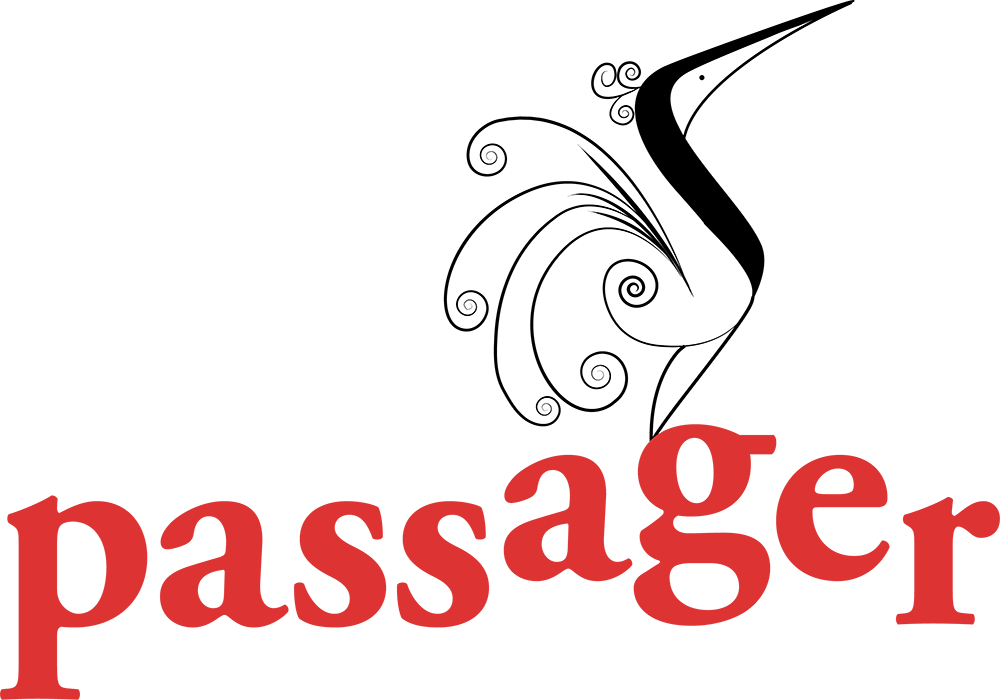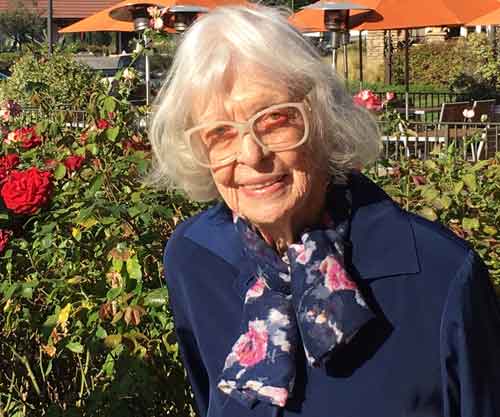The Poets of Ingleside

Celebrating new passions in old age, with poems by the Poetry Salon of Ingleside at Rock Creek.
10 minutes
TRANSCRIPT
During December, we’re featuring writing from books that Passager published in 2021. One of them was an anthology of poems by past and present members of the writers’ salon at Ingleside Retirement Community in Washington DC. Their backgrounds range from art and architecture, to history, government, and economics, to teaching, theology, and psychotherapy. Many have written government reports, research articles, memoirs, etc. But for most, poetry has been a new endeavor. The group’s long-time teacher/mentor is Bonnie Naradzay. Its members included centenarians Henry Morgenthau III and Sarah Yerkes, both of whose books Passager published in the past.
First, by Paul Armington, “Buddleja (Butterfly Bush)”
Now at my garden’s edge my Buddleja
Shoots sprays of gorgeous
Flowers above the wall.
Each one contrived by nature to attract a soul
That by a single probe fulfills its role
To achieve the flower’s endless right to life
And therewith gets the food that powers flight.
So swooping down and in with grab and push,
This Monarch gives its name to Butterfly Bush.
With gin and tonic in my hand, I see
How beautiful their co-dependency
And admire the way this interplay rejects
The timeless joys of life: flight, food, and sex.
Butterfly Bush, I know in fall you’ll slow
But come again and thrill me with your show.
“Buddleja (Butterfly Bush)” by Paul Armington.
Next “Tree” by the anthology’s co-editor Celia Crawford.
Joyce Kilmer says
That only God can make a tree
But 3 guys with a bright yellow grinder
Truck can take one apart,
Limb by limb
And chew it up and spit it out
In fine particles of dust
In six minutes flat.
They did it just now
Under my window
And now I have an
Unparalleled view of
The parking lot.
Celia Crawford’s poem “Tree.”
Here’s Nadine Dutcher’s poem “Grief.”
They say that everyone grieves in their own way.
What is my way? When I look at myself what do I see?
I am not crying incessantly or trying to live magically.
I am watching TV too late at night and too much during the day.
There’s paralysis in the morning and stress.
Should I get out of bed?
Should I make myself get dressed?
Or can I just lie down again instead.
There’s also perversity. I don’t want to read the sympathy notes.
Friends mean well but their words make me sad.
I know I should thank them, but with their quotes
I’m reminded again that he’s gone and I feel bad.
When do I miss him the most?
When he’s not there to pick up the phone
When I sit down to dinner and say our grace alone
When I can’t comment to him about what the president has said
When he doesn’t tell me to come to bed
I think I’m now living with a ghost.
“Grief” by Nadine Dutcher.
Elinor Horwitz wrote this next poem, “First Kiss.”
While flipping through a dopey magazine
In the allergist’s waiting room
I read that, no matter how old she becomes,
A woman never forgets the name of the guy
Who gave her her first kiss.
Is this true? And if so, isn’t it poor use
Of the fragile memory coils in your brain?
Clogging the synapses that could have helped you
Master those French verb tenses
Or learn to play the ocarina?
Well – okay okay – his name was Bruce Silverstein
And the site was a path bordering Lake Messalonskee
At the co-ed New England Music Camp.
It was long long ago, when I was thirteen
And still wearing a retainer.
Bruce was not the gorgeous guy who played the oboe.
He was not that tall, red-headed heart throb
Who played first violin in the quartet and was sixteen!
But Bruce was the guy who asked me to take a walk by the lake.
Suddenly he stopped, took off his glasses, and – very carefully –
Put them down on a stump.
Then he placed his hands on my shoulders, took a deep breath,
And planted a quick hard kiss.
In silence we walked back to the dining room,
Because you had to be on time for dinner.
And I tried not to rub the place
Inside my mouth, where the retainer had scratched.
We could think of nothing to say to each other.
The summer passed, and I saw Bruce often at band practice
Where we averted our glances like guilty conspirators.
And thinking back I decided that the boys in his bunk
Must have dared him to kiss me.
Isn’t that the sort of thing thirteen-year-old boys do?
Oh Bruce, it’s been such a short seventy plus years!
Whatever became of you, funny-looking Bruce?
Did you have musical children who played your old trumpet?
Did you, one night, reminiscing with old friends,
Remember the name of the girl you gave your first kiss?
“First Kiss” Elinor Horwitz.
Next, “What Matters Most at Ninety,” Bunty Ketcham.
What matters at ninety is earth under a woods path in summer
Fire from candles that flicker before mirrors and make of my room
a chamber of Versailles
Air fresh and cool from my open window that breathes me to sleep
every night
The sweet scent of lilacs that greets me spring mornings
Water – my life giver –
Tears or rain
The creek that flows past my window.
What matters at ninety is time
Long stretches of memories,
Short bursts of todays
Visions of possible tomorrows.
What matters at ninety is love
Love seen, love heard, love tasted, love felt.
As the touch of a hand, a wink, a smile, or a hug.
What matters at ninety is the essence of things
Colors blue and yellow and red,
Ever-present elements of earth fire air water
Time, love,
Words few
Feelings many
Stirrings of newness:
A poem, a song, a picture, a happening –
“What Matters Most at Ninety,” Bunty Ketcham.
The Ingleside Anthology’s other co-editor was Molly Quinn. Here’s her poem “Alas.”
Today I saw a graceful buck
Standing grandly beside the road.
His nascent rack of horns was small
But he didn’t look self conscious.
I worry about his safety.
As many cars go speeding by
I want to shout, scare him away.
My three grandsons flash to mind,
Their efforts to grow scraggly beards
Atop young, muscular bodies.
What traffic will they encounter?
My worry futile, as for the deer,
I can no longer protect them
From metaphorical traffic.
Molly Quinn’s poem “Alas.”
And finally from Ted Truman, “Our Friends Have Passed Away.”
Our friends have passed away
From among us here at Ingleside.
May the beauty of their home in
Heaven eclipse what they left behind.
Nancy and Thompson are gone
Leaving gifts of charm and mirth.
A ravine of plants and paths
Reminders of the world outside.
In Africa, France, Russia, Wyoming
They dwelled and left their marks
In elegant prose and poetry
Sublime and filled with sparks.
We honor their memory
And what they gave us all.
May we exit as gracefully
When we receive the call.
“Our Friends Have Passed Away,” Ted Truman, a fitting tribute to the writers in The Ingleside anthology who have died.
To buy The Ingleside anthology or Passager’s books by Ingleside writers Henry Morgenthau III and Sarah Yerkes, or to subscribe to or learn more about Passager and its commitment to writers over 50, go to passagerbooks.com.
Before we close, this from Passager’s assistant editor Rosanne Singer:
“Reading and answering emails that come to Passager is anything but routine. Almost daily the passion, urgency and commitment of the Passager community comes through in those messages. As a small literary press, Passager has brought together a worldwide community of writers, readers and listeners. To keep doing all that, we need your support. Even a small donation can go a long way to sustaining us. Go to passagerbooks.com and click on “donate” at the top of the page.”
Passager’s assistant editor, Rosanne Singer.
You can download Burning Bright from Spotify, Apple and Google Podcasts, Audible, and a host of other podcast apps.
For Kendra, Mary, Christine, Rosanne, and the rest of the Passager staff, I’m Jon Shorr.



